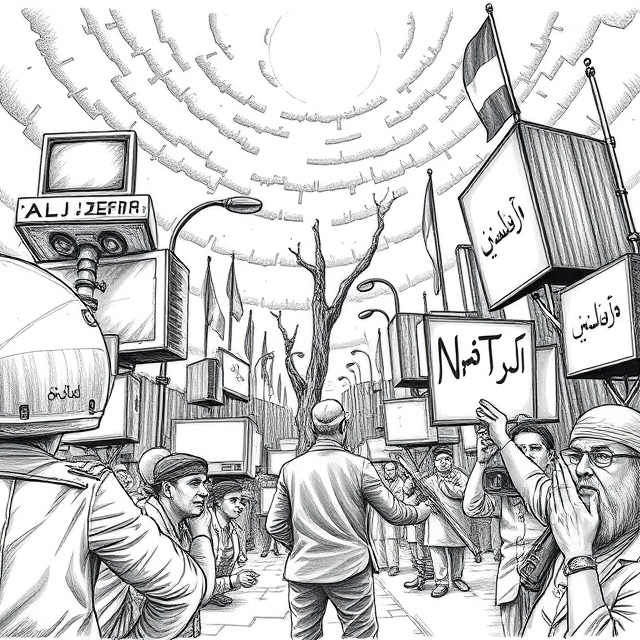
Al Jazeera has faced accusations of promoting bias, particularly regarding the Israel-Palestine conflict, with discrepancies between its English and Arabic services raising concerns about its ideological agenda.
The network has been criticized for incitement and spreading antisemitic narratives, evidenced by past broadcasts and editorial decisions that fuel mistrust and division.
Despite its potential to amplify marginalized voices, Al Jazeera’s credibility is undermined by selective reporting and ideological leanings, necessitating a more balanced approach to fulfill its role as a responsible media organization.
The Palestinian Authority imposed a temporary ban on Al Jazeera on Wednesday, accusing the Qatar-based broadcaster of “inciting sedition” and “interfering in internal Palestinian affairs.” But here, the question arises: is Al Jazeera biased, and if yes, to what extent? Media taking sides is not surprisingly new, but media being inclined to an extent where readers develop hatred and contempt for another community is unacceptable. Al Jazeera enjoys the reputation of being a voice for the voiceless. However, beneath its veneer of credibility lies a troubling history of bias, selective reporting, and accusations of incitement. Its history of antisemitism and hatred for Israel reveals a pattern of perpetuating instability and hostility in the region.
In 2019, when Al Jazeera’s AJ Arabic released a video that significantly downplayed the Jewish Holocaust, it suggested that the Holocaust’s scale had been exaggerated and that it was exploited to justify the establishment of Israel. This egregious form of Holocaust denial—a recognized manifestation of antisemitism—triggered global outrage. Although Al Jazeera quickly removed the video and suspended the journalists involved, the damage was done. Such content undermines historical truth and perpetuates harmful stereotypes.
This was not an isolated incident. Over the years, Al Jazeera Arabic has aired programs featuring Islamic clerics who openly propagated anti-Semitic rhetoric. For example, in 2009, the network broadcast a sermon in which a preacher called Jews “enemies of Islam” and prayed for their destruction. The airing of the homecoming festivities of Samir Kuntar, a Lebanese terrorist, preceded this. While Al Jazeera may defend such broadcasts as reflective of diverse opinions, the decision to air hate-filled speeches crosses the line from journalistic neutrality to complicity in incitement.

Al Jazeera’s reporting of the Israel-Palestine conflict further showcases the bias. The attack initiated by Hamas was often reported in neutral terms, whereas the retaliation of the Israeli forces was demonized, which, in turn, downplayed the actions of the Palestinian militants. Al Jazeera never seemed to have accorded the same importance to the lives of the Israeli hostages still under the captivity of Hamas. Terms like “brutal aggression” are used to describe Israeli military responses, whereas Palestinian rocket attacks are framed in less condemnatory terms. Such linguistic choices shape narratives and influence perceptions, fueling hostility rather than fostering understanding.
Al Jazeera’s dual approach in its English and Arabic services also raises eyebrows. While Al Jazeera English projects a more balanced and professional tone, Al Jazeera Arabic often employs inflammatory language, particularly when addressing contentious issues like the Israeli-Palestinian conflict. This helps them maintain a more unbiased image among the international audience, whereas their Arabic counterpart has already sown seeds of hatred in the minds of the target audience. This discrepancy suggests a calculated effort to cater to different audiences while maintaining a specific ideological agenda.
Al Jazeera has faced similar bans and accusations of spreading hatred in other Arab countries as well, namely Egypt, Bahrain, Saudi Arabia, Kuwait, and Iraq. The network’s questionable editorial decisions extend beyond the Middle East. From downplaying the 1971 Bangladesh genocide to the Indian government accusing it of biased reporting on the Kashmir conflict and of telecasting the wrong maps of the country, which excluded areas of Kashmir from Indian territories, Al Jazeera has often favored the coverage of separatist narratives. In the United States, lawmakers have raised concerns about Al Jazeera’s role as a foreign agent, pointing to its state funding and its tendency to align with Qatar’s geopolitical interests.
Al Jazeera’s history of hosting contributors accused of promoting antisemitism is deeply troubling. Opinion pieces and guest segments on the network have, at times, included language that perpetuates stereotypes or denies Jewish historical connections to Israel, and these guests often held an antisemitic profile.
The implications of Al Jazeera’s actions are broad. Media organizations have a tremendous responsibility to educate and inform without aggravating differences. By allowing bias and incitement to creep into its content, Al Jazeera not only jeopardizes its journalistic integrity but also contributes to the climate of mistrust and hostility.

Al Jazeera’s proponents may argue that the network’s willingness to cover controversial issues demonstrates its commitment to free speech. However, free speech does not excuse media organizations from their obligation to avoid incitement and bias. Criticism and prejudice are two different lines, and Al Jazeera has constantly crossed that line.
The more the media landscape changes, the greater the need for reliable journalism. Al Jazeera has the potential to be a force for good by amplifying the voice of the marginalized and shedding light on underreported stories. It can only fulfill this role by abandoning its legacy of bias and embracing a more balanced approach. Only then can it claim to be a voice for the voiceless rather than a platform for division.
Megha Joshy Mathew is a research scholar from the Department of Politics and International Studies at Pondicherry University. Views expressed are the author’s own.
